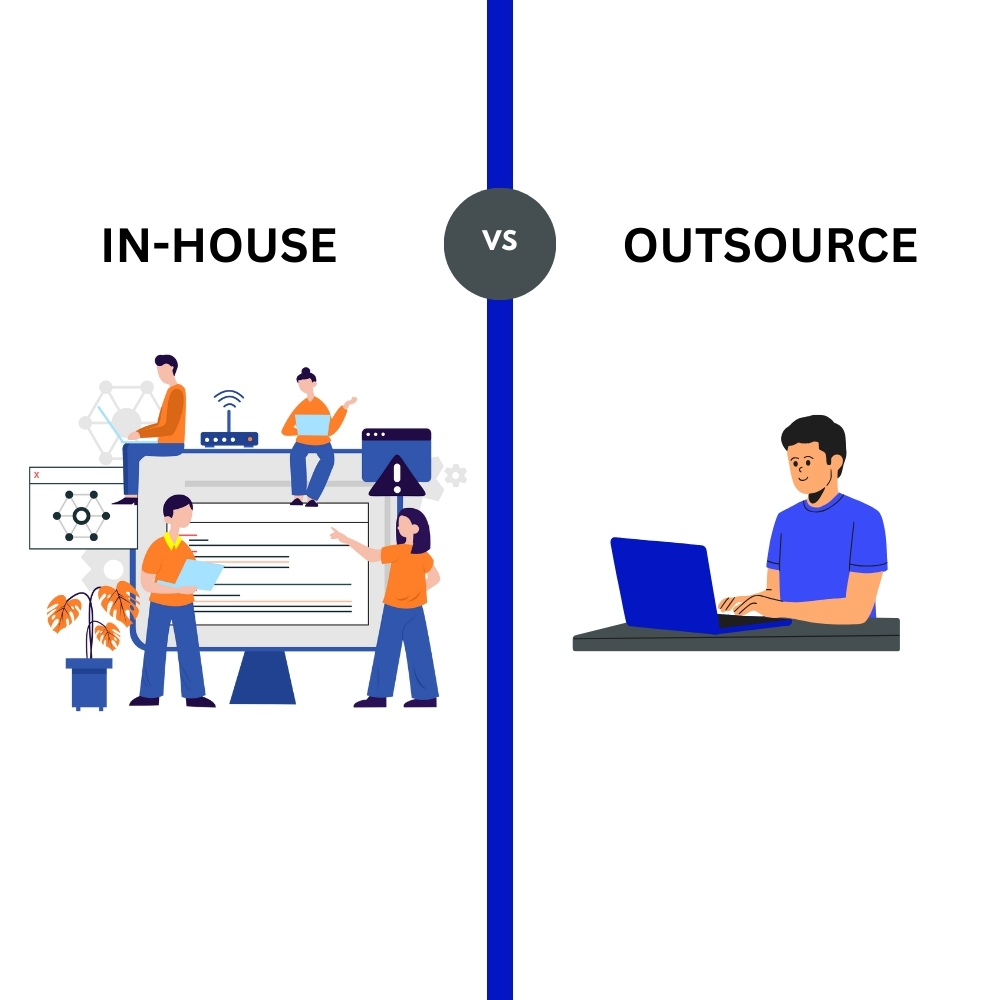“In-house vs. outsource” — it’s a decision that can make or break your software project. A recent Deloitte report found that 70% of companies outsource software development to cut costs and speed up delivery.
But is outsourcing really the silver bullet? Or does building an in-house team offer the control and alignment you need to succeed?
This decision isn’t just about money. It’s about timelines, talent, and trust. Some businesses thrive by keeping development close to home, where teams live and breathe their company’s mission. Others move faster and smarter by tapping into global experts and flexible resources.
Here’s the truth: there’s no one-size-fits-all answer. We’re here to help you figure out which option works for you. In this guide, we’ll break down the pros, the cons, and the differences between in-house and outsourced software development. By the end, you’ll know exactly what fits your business — and why. Let’s get started.
Key Findings
- In-house development offers control, accountability, but comes with higher costs and limited scalability.
- Outsourcing provides flexibility, lower costs, and access to global talent but may include communication challenges and quality risks.
- Choose in-house teams only if you have the expertise to manage them and require long-term development.
- Opt for outsourcing for short-term, scalable, or expertise-driven projects—especially if you lack the necessary team, specific skills, or need to accelerate timelines.
- A hybrid approach combines the strengths of both strategies for better results.
What is In-House Software Development?
In-house software development means building your team inside your company. You hire developers as employees. They work exclusively for your company to create and maintain software.
It’s like having your own dedicated crew. You’re in charge of everything. They sit under your roof (or work remotely for you alone). From coding to project planning, your team handles it all.
When to Choose In-House Development
In-house development makes sense when:
- You’re working on a long-term project critical to your business.
- The project involves sensitive or confidential information that isn’t even protected by an NDA.
- You need tight control over the process, which can also be achieved through team augmentation or staff augmentation.
- You want your team to fully align with your business goals.
If you plan to develop and maintain a solution for years, hiring an in-house team can be a worthwhile investment. However, you can always scale or bring in outsourced expertise as needed, whether for the short or long term.
Pros of In-House Software Development
In-house software development offers tailored software solutions, greater control, enhanced accountability, better security for intellectual property, and potential long-term cost savings, making it a strategic choice for businesses seeking alignment with their specific goals.
1. Customization: Tailored Solutions
With an in-house team, you get exactly what you need. Your developers can build a custom solution that aligns perfectly with your goals. If your needs change, they can adapt quickly without waiting for an external vendor.
However to be honest, an outside team can also build tailor-made solutions. They often bring a wide range of skills and can handle unexpected changes with speed.
2. Control: Full Project Oversight
You call the shots. You can prioritize tasks, manage timelines, and oversee the project’s progress daily. This level of control ensures everything aligns with your vision.
Don’t forget you need a CTO who can build the software and lead the team. You also need a project manager to keep things smooth. If you use staff augmentation with us, you have direct control over the developers. That satisfies the need for hands-on oversight.
For outsourcing the entire software project, we provide reports every two weeks to keep you informed and updated on the progress.
3. Accountability: Aligned with Company Goals
Your employees have a direct stake in the company’s success. They’re committed to delivering results because the outcome matters to their future. That accountability makes a big difference.
4. Intellectual Property: Data Security and Ownership
With in-house development, you retain full ownership of your software. Sensitive data stays within your walls. You have more control over security and intellectual property.
This is not the case when working with us. We sign NDAs, and you retain full ownership of the software and source code. Your ideas remain confidential within your business. You have full control over how everything is kept secure.
5. Cost Savings: Long-Term Benefits
While the upfront costs are high, in-house development can save you money in the long term. There are no recurring vendor fees or licensing costs. Once the software is built, you own it.
We do not charge licensing fees when the software is developed by us. You only pay for our service and for any required materials, such as a server. These costs would also apply if you were to handle development in-house.
Below is an example of a realistic in-house software team along with indicative costs for each role:
- Product Manager (1)
- Technical Lead (1)
- Mid-level Software Developer (2)
- Junior Software Developer (1)
- QA Engineer (1)
- UI/UX Designer (1)
- DevOps Engineer (1)
Costs:
Read our full guide about software development costs.
| Role | # of People | Avg. Annual Base Salary (USD) | Monthly Salary (Approx.) | Benefits/ Overhead (20%) | Total Monthly Cost |
|---|---|---|---|---|---|
| Product Manager | 1 | $120,000 | $10,000 | $2,000 | $12,000 |
| Technical Lead | 1 | $150,000 | $12,500 | $2,500 | $15,000 |
| Mid-level Developer | 2 | $100,000 each | $8,333 each | $1,667 each | $10,000 each → $20,000 total |
| Junior Developer | 1 | $80,000 | $6,667 | $1,333 | $8,000 |
| QA Engineer | 1 | $90,000 | $7,500 | $1,500 | $9,000 |
| UI/UX Designer | 1 | $95,000 | $7,917 | $1,583 | $9,500 |
| DevOps Engineer | 1 | $130,000 | $10,833 | $2,167 | $13,000 |
Explanation
- Total Monthly Cost is $86,500 for the entire 8-person team.
- Total Yearly Cost
simply multiplies the monthly cost by 12, giving
$1,038,000.
*This is just an example. Actual costs may be higher or lower depending on region, industry, and various other factors.
Cons of In-House Software Development
While in-house development has many benefits, it is not ideal for every project. Sometimes it can lead to problems if you decide to hire an in-house team for a project that can be easily managed by an outsourced team.
1. Skill Gaps: Limited Expertise
Your team may not have expertise in every technology. Niche projects could require skills your team doesn’t have. This can slow things down or result in lower-quality work.
2. High Costs: Salaries & Infrastructure
Hiring developers means paying salaries, benefits, and office costs. There are also recruitment, training, and ongoing tools to consider. It’s a significant investment.
3. Talent Shortage: Hiring Challenges
Finding the right talent locally can be tough. You’re limited to candidates in your area unless you consider remote hiring. And with remote hiring, you will have to bridge many gaps to monitor their progress.
4. Slow Hiring: Finding the Right Fit
Hiring the perfect developer isn’t easy. It takes time to recruit, interview, and onboard someone. Developers today prefer remote work, which adds another challenge.
5. Project Speed: Delays
With a fully in-house team, speeding up or scaling the project often means navigating a lengthy hiring process and onboarding phase to find and train the ideal candidates. This not only delays progress but can also significantly increase costs compared to hiring a software agency that provides top-tier talent ready to hit the ground running.
What is Outsourcing?
Outsourcing is hiring an external team or agency to handle software development for you. You pay for our time and expertise. We work on your project while you focus on other priorities.
It’s like bringing in an expert crew for a specific task. They don’t work for you full-time, but they help you get the job done efficiently.
When to Choose Outsourcing
Outsourcing works well when:
- You need to deliver a project quickly.
- You lack in-house expertise for specific tasks.
- Your team is stretched thin and needs support.
- You’re working on a short-term project.
If you want cost-effective solutions and fast results, outsourcing might be the way to go.
Pros of Outsourcing
Outsourcing provides cost-effective solutions, access to global expertise, and the flexibility to scale resources as needed. It allows businesses to focus on core activities while leveraging specialized skills to enhance project quality and efficiency.
1. Lower Costs: Budget-Friendly
Outsourcing can be cheaper than hiring full-time employees. You pay for the work done, not for salaries, benefits, or office space. When you outsource, you allow us to handle your project for the time being according to how you want it.
2. Scalability: Adjust Resources Easily
If you go for outsourcing, our team can scale up or down as needed. Need extra developers for a tight deadline? We’ve got you covered. Once the project is done, you stop paying.
Especially as a startup and need software development, don’t rush into hiring a full team for your MVP. Instead, focus on building a lean and efficient MVP with core features—outsourcing to experts, for example, to US. Use that to pitch to investors, and then scale your in-house team if needed. The best approach? A hybrid model with us that balances flexibility and expertise.
Trust us—this company was founded by as a startup, so we know exactly what you need at this stage. We’ve been where you are right now. Learn from our experience, avoid the mistakes we did, and save money.
3. Expert Access: Specialized Skills
Outsourcing opens doors to global talent. You can trust us to bring you experts with specific skills that your team doesn’t have. This speeds up projects and improves quality.
4. Focus: Free Up Internal Teams
By outsourcing software development, your team can focus on what they do best, while we handle the rest. You can prioritize your core business while we deal with the technical work.
Cons of Outsourcing
Outsourcing can pose challenges such as data security risks, communication barriers, reduced project control, and potential quality inconsistencies. These factors require careful management to ensure successful outcomes.
1. Security Risks: Data Exposure
Sharing sensitive information with an external team can feel risky. Proper contracts, like NDAs, are essential to protect your data. For example, here at Pixxel Solutions, we sign an NDA to address your privacy and security concerns.
2. Communication Barriers: Time & Language Issues
Outsourcing teams might work in different time zones. Communication delays can slow things down. Language barriers may also create misunderstandings.
To overcome this problem, all our software developers speak English, and we have talents from different locations.
3. Less Control: Limited Oversights
You can’t oversee every step when working with an external team. Less control can result in delays or outcomes that don’t meet your expectations. You will have to clearly communicate your goals to us in the beginning to ensure there are no misunderstandings.
This only applies if you fully outsource your project. To address this, we provide reports every two weeks as part of the agile approach. For team augmentation or software staff augmentation, the team works under your management, giving you full control.
4. Quality Issues: Inconsistencies
Some outsourcing teams may prioritize speed over quality. Without close monitoring, there’s a risk of inconsistent results. You have to ensure that all your terms and needs are stated and monitored clearly.
Don’t worry about that—this usually happens only with poor software agencies. It’s more common in regions where work ethics and education standards are lower compared to Western countries. A common example of this can be developers from India.
We focus on developers across Europe, where education standards are high, and we work with top talent to ensure quality.
In-House vs. Outsource Software Development: 5 Key Differences
When compared side-by-side, the following are the 5 key differences between in-house vs. outsource software development. It all depends on the type of project you are dealing with. In some cases, In-house hiring is the best. In other cases, outsourcing can be a game-changer for you.
| Aspect | In-House Teams | Outsourcing |
|---|---|---|
| 1. Expertise and Skill Access | Familiar with company processes, goals, and values but may lack expertise in specialized or emerging technologies. | Access to a global talent pool with niche skills, enabling faster delivery and better outcomes for complex tasks. |
| 2. Control and Communication | Immediate communication and direct oversight allow real-time discussions, goal alignment, and workflow control. | Requires structured communication; tools and frameworks minimize time zone, language, and process barriers. |
| 3. Cost and Budgeting | High fixed costs for salaries, benefits, infrastructure, and training; recruitment and training inflate costs. | Flexible, variable-cost structure; lower upfront investment; suitable for limited budgets and short-term projects. |
| 4. Flexibility and Scalability | Less agile; hiring and scaling down require careful planning and may involve layoffs. | Highly scalable; resources can be adjusted quickly to meet project needs or deadlines and reduced post-completion. |
| 5. Project Alignment and Culture | Strong alignment with company culture and long-term goals; fosters accountability and ownership. | May take time to align with business culture and priorities; clear communication and regular updates bridge the gap. |
Is There a More Effective Alternative to Hire Software Developers?
Making a decision regarding an in-house vs. outsourced development team does not have to be a this-or-that approach. You can approach your concerns in many ways which can prove more beneficial to you.
Pro Tip: The Hybrid Approach
A hybrid approach can give you the best of both worlds. You can combine your in-house team’s commitment and control with the flexibility and expertise of our outsourced team.
For example, you can keep core tasks in-house while outsourcing niche projects to our development team. It might be the right case for you however there is not a 100% fits all answer.
If you’re looking to see how we can assist you with your software development, feel free to contact us.
Don’t shy away from outsourcing expertise. However, choose wisely—trust us when we say that chasing the cheapest option, like in India, often leads to paying twice. You can learn more about offshoring software development in our other article.






